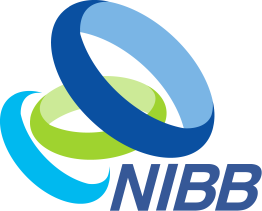
基礎生物学研究所

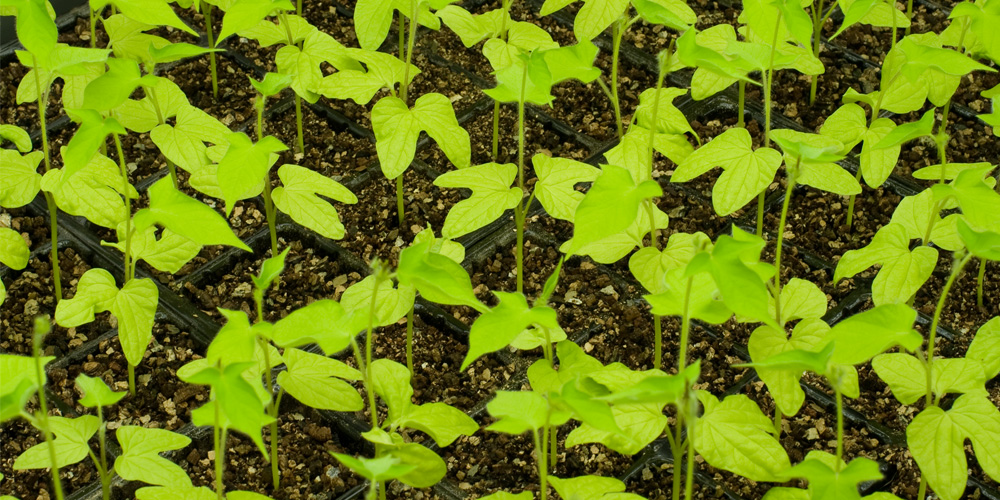
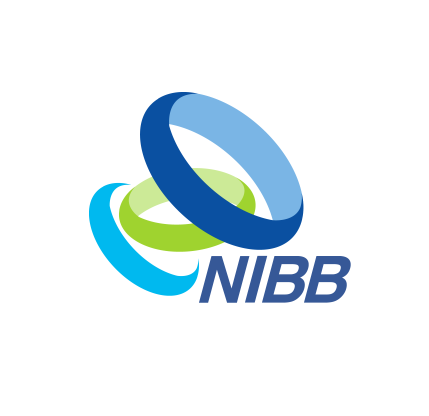

| Venue | EMBL Heidelberg, German |
|---|---|
| Date | Oct. 19-21, 2017 |
10月18日〜25日に、ドイツ・ハイデルベルグにあるEMBLを訪問し、EMBL PhD symposiumへの参加およびNoh研究室の訪問をおこないました。
シンポジウムでは、様々な分野の多くの研究者や科学コミュニケーションの専門家が講演をしてくださいました。これだけの規模のシンポジウムをEMBLの学生が主催していること、また多くの企業が協賛していることに大変驚きました。数々の講演はもちろん興味深かったのですが、最も印象的だったのはキャリアについてのセッションです。博士号取得後アカデミックと企業どちらを選ぶか、キャリアと家庭のバランスをどう取るかなどといった将来の不安や問題は、日本の学生だけでなく、世界中の学生が抱えている共通の事項なのだと知ることができました。このような問題に対する正解はありませんが、学生だけでなく招待講演者の先生方も活発な議論に参加していたのが心に残りました。
シンポジウムの後、Noh研究室を訪問し、研究室の皆さんに研究発表をさせていただきました。発表中に多くの質問をいただき、自分の研究について他の視点から考え直す良いきっかけとなりました。また、当日おこなわれていたゲノムバイオロジーユニットのセミナーに参加することができました。このセミナーでは、毎週ユニット内の各研究室のポスドクや学生が持ち回りで発表をするそうです。とてもインタラクティブでオープンな雰囲気のセミナーでした。Noh研究室訪問後、Ellenberg研究室の大塚博士とお会いして、研究室の案内をしていただきました。EMBLやヨーロッパでの研究生活について伺うことができ、今後のキャリアを考える上で大変参考になりました。
今回のEMBL訪問で、海外の研究者の発表を聞き、自分の研究を紹介したことで、世界中の人達を惹きつけることできる研究をしていきたいと強く思いました。このような素晴らしい機会を与えてくださった、基礎生物学研究所およびEMBLの皆様に心より感謝申し上げます。
10月19日 - 21日: Ph.D. Symposium参加
10月23日: Dr. Noh研究室訪問
基礎生物学研究所 核内ゲノム動態研究部門
石井智子(総合研究大学院大学 大学院生)
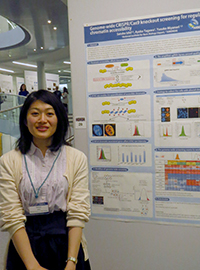
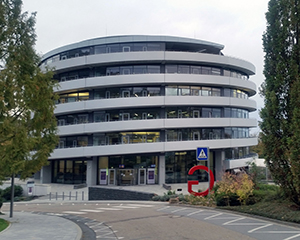
-----------------------------------
今回の派遣では19th EMBL PhD SymposiumとEMBL イタリア モンテロトンドのHackett Labを訪れた。
ハイデルベルグで行われたSymposiumはBridging the Gaps: Interdisciplinary Approaches in the Life Scienceというテーマであった。分子レベルの研究から、果てはメディアへの伝え方まで、あらゆる”Gap”を意識したシンポジウムであった。そのため、自らの研究とは異なる内容の発表を理解すること、私の研究分野に不慣れな人に“英語”で説明することの大変さ、自分の英語の拙さが身に染みてわかった。一方そのおかげで、よく似た研究をしている学生への説明は自信を持って発表を行うことができた。シンポジウム後はゲームやダンスパーティーがあり、文化のGapを飛び越えることで、EMBLの学生と腹を割って話すことができた。
その後イタリア モンテロトンドのHackett Labを訪問した。昨年スタートしたばかりの彼のラボでは、真新しい実験器具とスタートして間もないとは思えないほどフレンドリーなスタッフが迎えてくれた。EMBLセミナーとして口頭発表させていただいた後、ラボのプログレスミーティングへの参加や実験までさせていただいた。少しでも間の時間を見つけては、朝から夕方まで各スタッフの研究内容、私の研究の欠点や解決方法まで丁寧に議論していただけた。
どちらの場所の学生も現在のテーマの他に、興味がある別のテーマを考えており、さらに将来設計もよく考えていた。私も彼らを見習い、自らのテーマと将来を考える絶好のきっかけになる今回の訪問であった。
最後になりましたが、今回の訪問をサポートして下さった国際連携室の方々をはじめ、吉田先生、藤森先生に厚く御礼を申し上げます。
10月19日 - 21日:Ph.D. Symposium参加
10月23日:Dr. Hackett研究室訪問
基礎生物学研究所 生殖細胞研究部門
平野高大(総合研究大学院大学 大学院生)
-----------------------------------
It was so lucky for me to have a chance to visit EMBL. The trip was wonderful and fruitful. I got some nice advice from my host lab and had an impressive experience in the following symposium.
My host PI, Dr. Rainer Pepperkok and his team members introduced their research to me, and discussed my current studies as well, during the one-day-stay in their lab. I got some useful advice from them. My research is generally genetic analysis while Dr. Pepperkok’s team is good at cell biology, specifically on ER vesicle traffic. After listening to my progress report they helped me in making a clear picture of what I can possibly do for the next step and also gave me some detailed advice like what kind of marker might be suitable for me; they literally guided me to build a gap between my genetic studied and further cellular level analysis. And the discussion on their seminar impressed me so much. They are very open to giving and accepting advice from others. At some points the discussion turned heated and they were never afraid of speaking their minds. This was my first time joining a western style discussion and it was really like a brainstorm for me.
For the next three days we attended the PhD symposium with other EMBL students. Besides all those fantastic eye-opening lectures and talks, I want to talk about our exciting experience at the party on the last day of conference. In Asia we never had this type of party. Seeing all other western students singing and dancing, we debated for a while of whether we would join them or not. Eventually we jumped into the crowd when we realized just standing there was worse than dancing in front of a bunch of people. And we fit in right away. We kept drinking and dancing with other EMBL students, enjoying the rare opportunity for relaxing. Though it was a small step for me, it was an interesting starter to attempt to integrate into western culture.
The four-day trip was short but its effect on me was significant. Besides the useful advice and tips I got from the lab tour and conference, I love my research more than ever before. For a long time I’d buried myself in the papers related to my studies; but now I’ve started to take a fresh look on the papers related to plant science. Some bioinformatics and structural biology lectures in the symposium might have pushed me this way since they were really difficult for me to understand. Anyway the result is good for me, being more open-minded. Another change was beyond my expectation. I feel more independent in my studies and life. I don’t know why or how; but after getting back I’m more comfortable to learn new things in my studies and am not caring so much about loneliness anymore. I hope this trip is a good starter for my two years deferment study here.
18, October Dr. Pepperkok’s Lab. (Heidelberg)
19-21, October Ph.D. Symposium
Division of Symbiotic Systems, NIBB
Liu Meng (SOKENDAI)
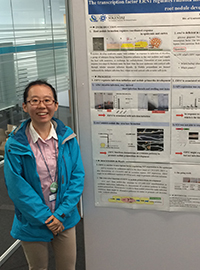
-----------------------------------
In October 2017, I had the pleasure of attending the 19th EMBL PhD symposium in Heidelberg, Germany, with four other NIBB students. The symposium was entirely organized by 2nd year EMBL PhD students, who did a really great job in compiling a fantastic meeting. About 100 PhD students from all over the world and 15 invited speakers participated in the symposium. Many students came from Finland and Australia, since EMBL has partnerships and sites in those countries as well. Surprisingly, there were only a few German students, which might reflect the very international character of EMBL. The symposium took place in the ATC (Advanced Training Centre) building on the EMBL campus, located about half an hour from the Heidelberg city center by public transport. The ATC building has an impressive architecture inspired by a DNA double helix, creating a dynamic and innovative atmosphere. This year’s theme was “Bridging the Gaps - Interdisciplinary Approaches in Life Sciences”, so speakers from interdisciplinary fields gave lectures, e.g. synthetic biology, systems biology, tissue engineering, microfluidic technology, and state-of-art fluorescence imaging. Furthermore, there were interesting ‘Science and Society’ talks and a plenary discussion on topics like talking to journalists, women in science, and career paths. Although the schedule of the symposium from 9 am to 8 pm (excluding the evening program) was a little hard, the diverse topics and generous breaks made the symposium a very enjoyable and informative time. I had the chance to present my research in a poster presentation and short talk to a broad audience and got positive feedback from many fellow students. Inspired by the lectures, I want to apply 3D tissue culture, microfluidics, and new fluorescent tools in my future research. The lunch, dinner, coffee breaks and evening program offered many chances to talk with other students. Thus, the meeting was not only a good opportunity to network with peers from various countries, but also to connect with the other NIBB students.
After the EMBL PhD symposium, I visited the philosopher’s path and the castle in the beautiful city center of Heidelberg and met Japanese postdocs, who work at EMBL or the Max-Planck-Institute and shared their experiences in Germany with me. On the last day, I visited the Schultz group, who work on the development of chemical tools for live cell imaging and manipulating cellular signaling. They kindly hosted me the whole day with the following schedule: lab tour, my 30 min presentation, discussion of my research, lunch, coffee and cake, one-to-one discussion with Schultz lab members. Since our fields of study were related, we had lively scientific discussions and they gave me valuable advice for my research.
All in all, I had the impression that EMBL is a great place for postdoc studies, due to the cutting edge research, excellent core-facilities with superb technical support, and high internationality. Finally, I want to thank all the involved EMBL and NIBB members for making these valuable experiences possible which will definitely help me in my future research and career.
19-21, October Ph.D. symposium
23, October Dr. Schultz’s Lab. (Heidelberg)
Division of Quantitative Biology, NIBB
Haruko Miura (Kyoto University)
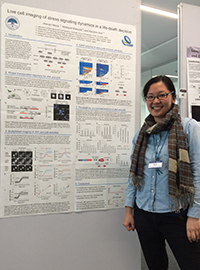
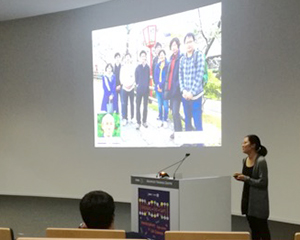
-----------------------------------
ドイツのハイデルベルグで開かれた19th EMBL PhD symposiumに基生研のサポートを得て参加してきました。このEMBL PhD symposiumというのは、行く前は知らなかったのですが、すべてEMBLの一年目のPhD studentsによって企画・運営されており、その年のテーマの決定から講師の選定、資金の獲得や果ては最終日のパーティーに至るまで、各地から集まった学生の努力によって成り立っています。今回最も印象的だったのは、EMBLの研究所の設備というよりは、こういった学生の、研究および課外活動における主体性だったように思います。EMBLのプログラムの数々にもそういった学生を育てようという意図が拝見されました。もちろん設備もかなり良く、こうした場所を選択肢として持つヨーロッパの学生を少し羨ましく感じました。とはいえ、もちろんアジアからの留学生がいないわけではなく、日本からEMBLに入った優秀な修士の学生とも話しました。彼に聞いたところ、学部生時代にEMBLの教授の一人の講演を日本で聴く機会があり、それをきっかけとしてEMBLのPhDコースを志したということでした。日本からもこうした海外の研究所や大学に進む学生がもっと増えると良いと思いますし、そのためにももっと学部生が情報を得られる仕組みがあると良いと思いました。ヨーロッパの研究所としてのEMBLの熱量はすさまじいものがあり、広い食堂のそこかしこで食事をしながら色々な議論が発展している様子は、新しい研究の萌芽の様を目の当たりにしているようで、大変圧倒されました。
PhD symposiumは大変よく練られていて、招かれた講師陣の発表は大変興味深かったですし、また参加者から選ばれた何人かのPhD studentsの発表も面白い内容が多かったです。一日の講義の後にはBlackboard Sessionがあり、興味のあるトピックを選んで、その日の講義を担当した先生と少人数でディスカッションすることができました。みなさん大変フランクで、学生からもたくさん質問が出て、活気のあるセッションでした。一日の終わりには美味しい食事と飲み物が待っていて、かなり満ち足りた数日間を過ごしました。連日かなり密なスケジュールでしたが、朝はホテルからEMBLまでの小道を歩いたりして、ヨーロッパの秋を堪能しました。休日は今回一緒に参加した石井さんのおかげでEMBLやHeidelberg大学の日本人研究者と食事を共にする機会があり、名物のシュニッツェルを食べながら、海外で研究するとはどういうことなのか、色々話を伺うことができて有意義でしたし、楽しかったです。最終日の前日には柊先生の研究室を訪問し、自分の研究について発表させてもらい、多くのコメントをいただきました。その後ラボのメンバーの方々から直に研究内容について聞くこともできました。単身研究室を訪問するのはかなり緊張しましたが、得るものも大きく、また少し自信がついたように思います。
最後になりましたが、今回の派遣をサポートしていただいた国際連携室の方々をはじめ、所属する研究室の先生方、受け入れ先の柊研究室を含むEMBLの方々には大変お世話になりました。この場を借りて厚く御礼申し上げます。
10月19日―21日: Ph.D.シンポジウム参加
10月23日: Dr. Hiiragi研究室訪問
基礎生物学研究所 生物進化研究部門
堀内 雄太(総合研究大学院大学 大学院生)
-----------------------------------